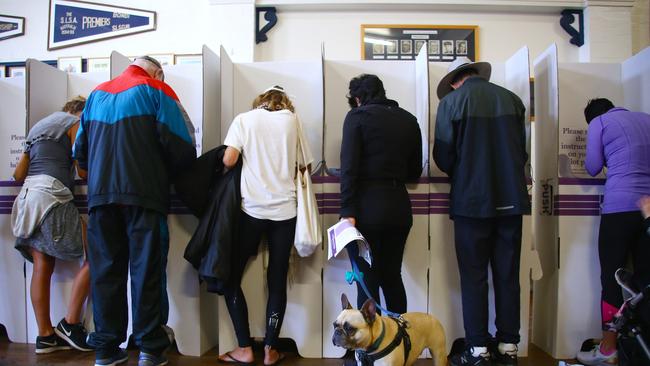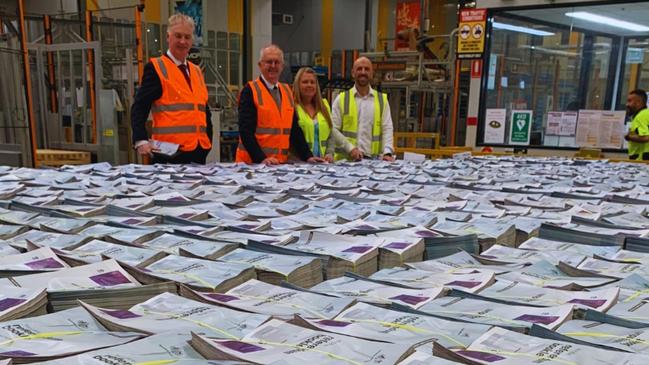Yes or No? Everything you need to know about the Voice referendum
Wherever you sit in the Voice debate, in less than three weeks all Australian citizens over the age of 18 years will have to vote. Here is what you need to know.
National
Don't miss out on the headlines from National. Followed categories will be added to My News.
You’ve listened to both sides of the debate, and now it is your time to choose. And what will happen if the Yes vote wins, or the No vote wins? We look at the issues.
WHAT AM I VOTING ON?
Once at the polling booth, you will be handed a ballot paper with the proposed alteration to the Constitution on it. You have to answer YES or NO to the following question:
“A proposed law: to alter the Constitution to recognise the First Peoples of Australia by establishing an Aboriginal and Torres Strait Islander Voice, do you approve of this proposed alteration?”
If the Yes vote wins, a new Chapter IX would be inserted at the end of the Constitution, saying:
“In recognition of Aboriginal and Torres Strait Islander peoples as the First Peoples of Australia:
(i) there shall be a body, to be called the Aboriginal and Torres Strait Islander Voice;
(ii) the Aboriginal and Torres Strait Islander Voice may make representations to the parliament and the Executive Government of the Commonwealth on matters relating to Aboriginal and Torres Strait Islander peoples;
(iii) the parliament shall, subject to this Constitution, have power to make laws with respect to matters relating to the Aboriginal and Torres Strait Islander Voice, including its composition, functions, powers and procedures.”
DO I HAVE TO VOTE?
• It is compulsory for every Australian citizen aged over 18 to vote.
• You can only vote once.
• If you fail to vote without a valid reason, you may be fined $20.

HOW CAN I MAKE SURE MY VOTE COUNTS?
You need to indicate your vote by clearly writing YES or NO in the box.
Avoid using symbols such as a tick or cross.
WHEN AND WHERE CAN I VOTE?
The referendum will be held on Saturday, October 14.
Thousands of polling booths will open from 8am-6pm local time. Similar to election day, booths will be set up at local schools, halls and churches.
Locations will be available on the Australian Electoral Commission website.
If you are away on October 14 for any of the following reasons, you can vote early from two weeks before polling day, or on the day outside the electorate where you are enrolled to vote:
• More than 8km from a polling place
• Travelling
• Unable to leave your workplace to vote on voting day
• Seriously ill, infirm or due to give birth shortly (or caring for someone who is)
• A patient in hospital and can’t vote at the hospital
• Have religious beliefs that prevent you from attending a polling place
• In prison serving a sentence of less than three years or otherwise detained
• A silent elector
• Have a reasonable fear for your safety or wellbeing
If you’re interstate on the day and need to cast your vote, you will need to visit a designated interstate voting centre.
CAN I VOTE ONLINE?
No. There is no legislative provision allowing this.

WHAT SHOULD I ASK MYSELF BEFORE I VOTE?
• Yes23 campaign director Dean Parkin said people should ask themselves these three questions before they decide:
1. After 235 years of a modern Australia should we recognise Aboriginal and Torres Strait Islander peoples in the Constitution as the first peoples of this country? Should we make a simple acknowledgment of that fact in the Constitution?
2. Do we want to see change in Indigenous communities across the country and if so do we think the best way to achieve that is to involve Indigenous people in decisions about their families and communities?
3. Do you want to be part of a unifying moment in our country, bring the country together with a Yes vote in the referendum?
• Prominent No campaigner and Shadow Minister for Indigenous Australians Senator Jacinta Nampijinpa Price said people should ask themselves these three questions before they decide:
1. Do we want division in our Constitution?
2. Do we want to risk massive change without any details?
3. Do you believe another bureaucracy in Canberra will solve the problems in remote Australia?
HOW DO WE KNOW WHO WINS?
In order for the Voice to parliament to succeed, there must be a special double-majority – a national majority of Yes votes, and a majority in at least four out of the six states.
All votes from polling booths will be counted on the night as will pre-poll votes and those postal votes already received.
This means we should have a reasonable idea of the result that night unless it is very close.
In that case, we would need to wait until all postal votes are counted and because all votes are counted twice to double-check the result, that could take weeks.
WHAT HAPPENS IF THE YES VOTE WINS?
Parliament – including the Government, Opposition and crossbenchers – will be asked to “finalise” details and functions of how the Voice will operate.
In terms of its size, the Calma-Langton co-design report provided to the Australian Government has recommended the Voice committee be made up of 24 members that represent a broad section of the Indigenous population and include equal gender representation.
Two members will be allocated from each state and territory.
In regards to the details, Mr Parkin said “an incredible amount of work has been done on this over the years, so parliament won’t come into this with a blank piece of paper.
“When people ask, ‘Where’s the detail?’ that is the job of the parliament to decide that,” he said.
He said the aim is for multipartisan input so that the parliament is happy with the form of the Voice and to see it as a “useful, practical way parliament and Government can receive advice from Indigenous people”.
WHAT HAPPENS IF THE NO CAMPAIGN WINS?
If the double-majority is not met, no change will be made to the Constitution.
No campaigners say they will make use of existing bodies and see what is working and what is not when it comes to assisting disadvantaged Indigenous peoples.
“Rather than constitutionally enshrining a huge and legally risky bureaucracy, we should be looking at existing organisations claiming to be a Voice for marginalised Australians and ensure they are transparent and accountable,” Senator Price said.
“My Coalition colleagues and I have been working to launch an inquiry into Aboriginal Land Councils and similar organisations to understand what is working and what needs to be rethought?
Opposition Leader Peter Dutton has vowed to hold a second referendum if the Coalition succeeds at the next election to allow Australians to vote solely on the issue of constitutional recognition of First Nations people.





